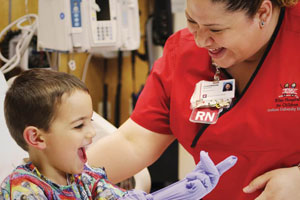
If your child has experienced a traumatic hand injury (such as a fracture or dislocation) or has a congenital hand disorder (such as a cleft hand, syndactyly or polydactyly), there are surgical options available to improve form and function. The Hand Program at Riley Children's Health provides expert reconstructive plastic surgery for traumatic hand injuries and congenital hand disorders. Our doctors and surgeons are committed to providing advanced, expert care to help your child live a full and normal life.
Reconstructive plastic surgery corrects physical abnormalities or traumatic injuries, improves body functions and can create a more normal appearance. Your child will receive compassionate, skilled support from our team of board certified doctors who are specially trained in pediatric plastic surgery.
The Hand Program team also includes experienced pediatric anesthesiologists and dedicated plastic surgery nurses. Anesthesiologists maintain your child’s comfort and safety during hand surgery and provide pain management care after surgery. Specially trained dedicated plastic surgery nurses care for your child before, during and after surgery through recovery. We will inform you of your child’s condition throughout the surgical process.
Riley Children's is consistently ranked among the top children's hospitals in the country by U.S.News & World Report. Our Plastic Surgery Department, which includes the Hand Program, is a regional and national referral center for pediatric plastic surgery. You can rest easy knowing that your child is being cared for by our knowledgeable hand and plastic surgery specialists.
Polydactyly & Syndactyly
We often treat children born with polydactyly and syndactyly. Polydactyly literally means “many fingers.” It is when there is an extra digit on the hand. Syndactyly is a condition in which a child is born with multiple digits of the hand fused together.
With polydactyly, the extra digit is often on the thumb side or the little finger side of the hand. Children with an extra digit on the thumb side of the hand sometimes have a syndrome that can cause anomalies in other areas of the body, such as in the heart, spinal cord or perianal/rectal area. Having an extra digit on the little finger side of the hand is usually genetic and occurs most often in African-American children.
Fortunately, all types of polydactyly can be treated, and children with the condition can usually have a normal hand with near 100 percent function if treated correctly and early. Treatment of polydactyly depends on where the extra digit is located on the hand and which digit is duplicated. Children with this condition may have extra soft tissue, extra soft tissue and bone, or something more. All types of polydactyly must be treated surgically. Surgery on the little finger side is less invasive than on the thumb side. Surgery to remove the extra digit is typically done by around 6 months of age. This will give your child’s hand and brain development time to accommodate the removal of the extra digit.
With syndactyly, the most common fusion is between the third (middle) and fourth (ring) fingers. A child with this condition may have syndactyly of one or both hands. Most often, when a child has syndactyly of both hands, there is an underlying syndrome associated with it that also causes other anomalies, such as facial anomalies. Syndactyly may be hereditary depending on the associated syndrome.
Like polydactyly, the treatment for syndactyly is always surgery to separate the fused digits. The complexity and timing of the surgery will vary depending on which digits are fused and how they are fused, such as by the skin, bone or joints. If your child’s syndactyly is associated with a syndrome, the pediatric hand surgeons with the Hand Program at Riley will coordinate care and surgeries with specialists who are treating other anomalies.
Doctors and Locations
Doctors
Program Forms & Resources
Program Forms & Resources
Riley Children's Health provides the following forms for parents, healthcare providers and personnel. We have also curated relevant resources from other websites and provided links with brief descriptions of the information that is available.
Resources
-
American Society for Surgery of the Hand
This professional organization provides in-depth information on congenital hand conditions for patients and their families.
Related Departments
Related Departments
We provide multispecialty care for a number of conditions. Below are links to our related departments.
Health Professionals
For Health Professionals
The pediatric plastic surgeons at Riley Children's work with referring providers to provide advanced diagnosis and treatment for patients with hand anomalies and injuries.
Refer A Patient

Riley Children's works with referring physicians in Indiana and beyond.
To refer a patient, please call 317.948.0345.
Education
As faculty members of the Indiana University School of Medicine, our plastic surgeons help train the next generation of pediatric healthcare specialists. The surgeons with the Hand Program work with medical students and residents to prepare them for successful careers in pediatric surgery.

